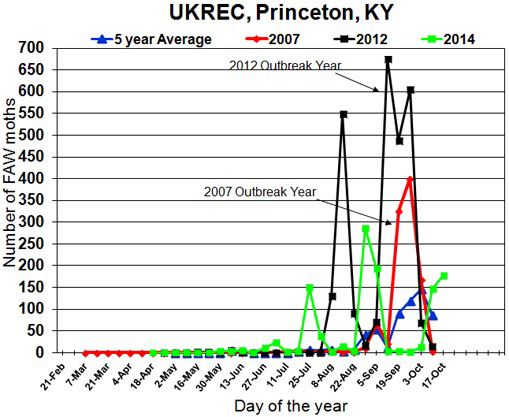|
Fall Armyworm Moth Captures Are Rebounding
DR. DOUG JOHNSON
PRINCETON, KY.
Capture of fall armyworm moths (FAW) in the UK IPM traps at the UK Research and Education Center (UKREC) in Princeton, KY have increased for the last 2 weeks. These captures are not as great as those from the known outbreaks of 2007 and 2012. Nevertheless, the current capture level is greater than the rolling 5-year average, and is approximately the same level of the population that caused problems across Kentucky earlier this season. This makes the situation worth watching (See Figure 1).

Figure 1. Fall armyworm moth counts in Princeton, KY.
Moth capture is, of course, only an early warning of what might happen in the future. Depending upon temperatures, caterpillars from these moths will appear in 2 weeks or so. This appearance could coincide with emergence of our wheat crop, which could make this population problematic, especially if the wheat seedlings are very young. Well established wheat can be grazed off and still survive, but very young seedlings may be killed.
Remember there are two feeding types of FAW, which are called corn or small grass types. The small grass form is the most common in Kentucky and is the form that caused problems in forages, home lawns, and golf courses earlier this summer. This is the form that would be important to our wheat crop. The corn form is less common and less important to our field crops at this time of the year.
Producers, consultants, and scouts should examine wheat field for FAW caterpillars AND pay particular attention to which plants are being attacked. The following are three situations that may be faced:
• FAW not present – No problem.
• FAW present and feeding on wheat – Could be important if the seedlings are quite young. Insecticide may be needed. If damage is heavy, do not be too quick to replant. Established wheat seedlings will grow back, and replanting in this situation may produce a double stand, leading to many other problems.
• FAW present and feeding on corn seedlings – Bears watching, but is unlikely to require insecticidal control.
At this point, vigilance in monitoring your wheat crop is the most important item. FAW will die with a heavy frost, but not with a light frost, especially in fields with a great deal of surface cover. ∆
DR. DOUG JOHNSON: Extension Professor of Entomology and IPM Coordinator, University of Kentucky
|
|